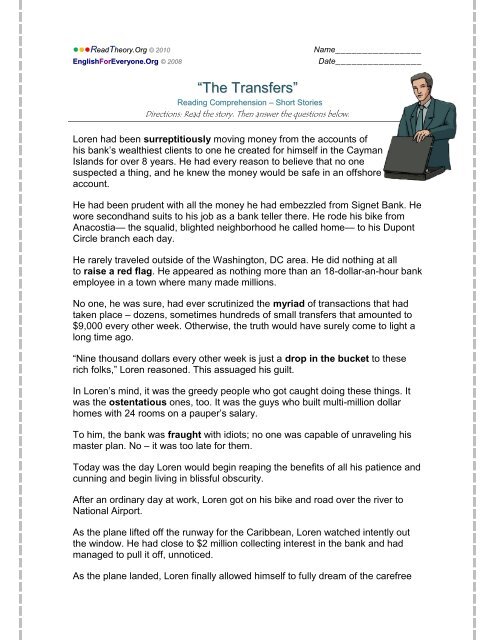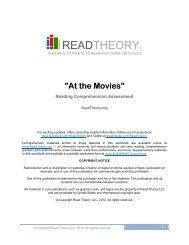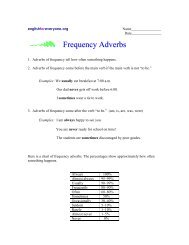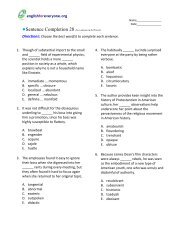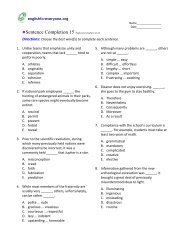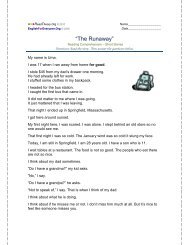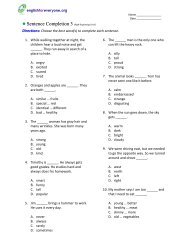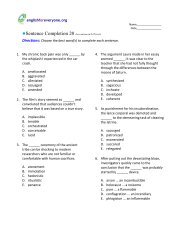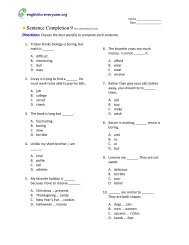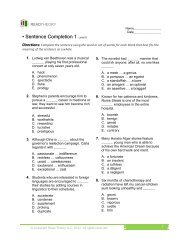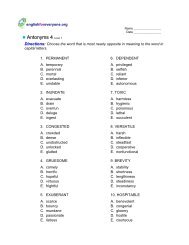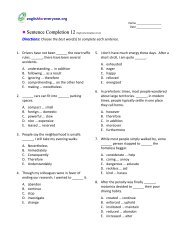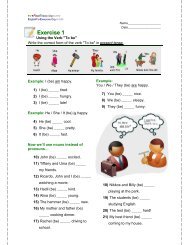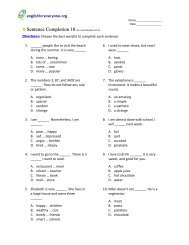“The Transfers” - English for Everyone
“The Transfers” - English for Everyone
“The Transfers” - English for Everyone
You also want an ePaper? Increase the reach of your titles
YUMPU automatically turns print PDFs into web optimized ePapers that Google loves.
●●●ReadTheory.Org © 2010 Name________________<br />
<strong>English</strong>For<strong>Everyone</strong>.Org © 2008 Date________________<br />
<strong>“The</strong> <strong>Transfers”</strong><br />
Reading Comprehension – Short Stories<br />
Directions: Read the story. Then answer the questions below.<br />
Loren had been surreptitiously moving money from the accounts of<br />
his bank’s wealthiest clients to one he created <strong>for</strong> himself in the Cayman<br />
Islands <strong>for</strong> over 8 years. He had every reason to believe that no one<br />
suspected a thing, and he knew the money would be safe in an offshore<br />
account.<br />
He had been prudent with all the money he had embezzled from Signet Bank. He<br />
wore secondhand suits to his job as a bank teller there. He rode his bike from<br />
Anacostia— the squalid, blighted neighborhood he called home— to his Dupont<br />
Circle branch each day.<br />
He rarely traveled outside of the Washington, DC area. He did nothing at all<br />
to raise a red flag. He appeared as nothing more than an 18-dollar-an-hour bank<br />
employee in a town where many made millions.<br />
No one, he was sure, had ever scrutinized the myriad of transactions that had<br />
taken place – dozens, sometimes hundreds of small transfers that amounted to<br />
$9,000 every other week. Otherwise, the truth would have surely come to light a<br />
long time ago.<br />
“Nine thousand dollars every other week is just a drop in the bucket to these<br />
rich folks,” Loren reasoned. This assuaged his guilt.<br />
In Loren’s mind, it was the greedy people who got caught doing these things. It<br />
was the ostentatious ones, too. It was the guys who built multi-million dollar<br />
homes with 24 rooms on a pauper’s salary.<br />
To him, the bank was fraught with idiots; no one was capable of unraveling his<br />
master plan. No – it was too late <strong>for</strong> them.<br />
Today was the day Loren would begin reaping the benefits of all his patience and<br />
cunning and begin living in blissful obscurity.<br />
After an ordinary day at work, Loren got on his bike and road over the river to<br />
National Airport.<br />
As the plane lifted off the runway <strong>for</strong> the Caribbean, Loren watched intently out<br />
the window. He had close to $2 million collecting interest in the bank and had<br />
managed to pull it off, unnoticed.<br />
As the plane landed, Loren finally allowed himself to fully dream of the carefree
life he was about to begin. He moved down the airplane steps, across the tarmac<br />
and headed toward the airport. The balmy air felt com<strong>for</strong>ting to his skin.<br />
He breathed in slowly and deeply with anticipation, and then he was surprised to<br />
hear a familiar voice.<br />
“Hey, Loren. Not so fast.”<br />
Questions:<br />
1) As used in paragraph 1, which is the best synonym <strong>for</strong> surreptitiously?<br />
A. easily<br />
B. carefully<br />
C. overtly<br />
D. secretly<br />
2) "He had been prudent with all the money he had embezzled from Signet<br />
Bank."<br />
Which of the following is the best way to rewrite the above sentence from<br />
paragraph 2 while keeping its original meaning as used in the story?<br />
A. He had been showy with the funds he had taken from Signet Bank.<br />
B. He had saved all the money he had deposited into Signet Bank.<br />
C. He had felt guilty about all the money he had taken from Signet Bank.<br />
D. He had been discreet with all the money he had stolen from Signet Bank.<br />
3) What were some of the things Loren<br />
did to not raise suspicion?<br />
I. He wore secondhand suits.<br />
II. He rode a bicycle to work.<br />
III. He only made a certain number<br />
of transactions per week.<br />
A. I only<br />
B. I and II<br />
C. I and III<br />
D. I, II, and III<br />
4) The expression "to raise a red flag"<br />
(from paragraph 3) means to<br />
A. be guilty<br />
B. appear impoverished<br />
C. seem very smart<br />
D. give a warning signal
Questions (continued):<br />
5) What made Loren feel confident his<br />
crime would go undetected?<br />
I. The stolen money was being<br />
held in the Cayman Islands.<br />
II. He felt no one would suspect a<br />
bank teller of fraud.<br />
III. He had done nothing to show<br />
that he had become wealthy.<br />
A. I only<br />
B. I and II<br />
C. I and III<br />
D. I, II, and III<br />
7) What kind of expression is "drop in<br />
the bucket" (from paragraph 5)?<br />
A. demonstrative, characterized by<br />
the open expression of emotion<br />
B. idiomatic, characterized by the<br />
use of figurative, not literal,<br />
language<br />
C. sarcastic, characterized by the<br />
use of harsh or bitter derision, or<br />
irony<br />
D. understatement, characterized<br />
by an expression that is weaker<br />
than the facts would bear out<br />
9) Which line from the passage best<br />
serves as its climax?<br />
A. “Hey, Loren. Not so fast.”<br />
(the final paragraph)<br />
B. Otherwise, the truth would have<br />
surely come to light a long time<br />
ago. (paragraph 4)<br />
C. Now it was too late <strong>for</strong> them.<br />
(paragraph 7)<br />
D. After an ordinary day at work,<br />
Loren got on his bike and road<br />
over the river to National Airport.<br />
(paragraph 9)<br />
6) If Loren carried out his scheme <strong>for</strong><br />
exactly 8 years, how much money<br />
would he have stolen?<br />
A. $9000<br />
B. $2,000,000<br />
C. $72,000<br />
D. $1,872,000<br />
8) As used in paragraph 4, which is<br />
the best synonym <strong>for</strong> myriad?<br />
A. overflow<br />
B. number<br />
C. multitude<br />
D. shortage<br />
10) Loren's attitude toward his bank<br />
colleagues was<br />
A. benevolent<br />
B. disdainful<br />
C. accepting<br />
D. fearful
11) As used in paragraph 6, which is<br />
the best antonym <strong>for</strong> ostentatious?<br />
A. lavish<br />
B. conspicuous<br />
C. childish<br />
D. modest<br />
12) As used in paragraph 7, what does<br />
the phrase “fraught with” mean?<br />
A. filled with<br />
B. short on<br />
C. lead by<br />
D. visited by<br />
Is Loren a bad person? If not, why? If so, what should be an appropriate<br />
punishment or consequences? Explain.<br />
________________________________________________________________________<br />
________________________________________________________________________<br />
________________________________________________________________________<br />
________________________________________________________________________<br />
________________________________________________________________________<br />
________________________________________________________________________<br />
________________________________________________________________________<br />
________________________________________________________________________<br />
________________________________________________________________________<br />
________________________________________________________________________<br />
________________________________________________________________________<br />
________________________________________________________________________<br />
________________________________________________________________________<br />
________________________________________________________________________<br />
________________________________________________________________________
Answers and Explanations<br />
1) D<br />
surreptitiously (adjective): sneakily, in a stealthy manner.<br />
At the beginning, the story says, “Loren had been surreptitiously moving<br />
money from the accounts of his bank’s wealthiest clients to one he created <strong>for</strong><br />
himself in the Cayman Islands <strong>for</strong> over 8 years. He had every reason to<br />
believe that no one suspected a thing.” Since Loren was moving money from<br />
bank clients’ accounts to his own, we know that Loren was stealing. Loren<br />
thought no one suspected his stealing, so Loren must have been moving the<br />
money in secret. We can infer from this in<strong>for</strong>mation that surreptitiously means<br />
in a stealthy manner. Secretly means in a hidden or concealed manner. Since<br />
doing something in a concealed way is similar to doing something in a<br />
stealthy way, secretly is a good synonym <strong>for</strong> surreptitiously. There<strong>for</strong>e (D) is<br />
correct.<br />
Easily means with ease. Doing something with ease is not the same as doing<br />
something stealthily, so easily is not a synonym <strong>for</strong> surreptitiously. There<strong>for</strong>e<br />
(A) is incorrect. Carefully means with care. Doing something with care is not<br />
the same as doing something stealthily, so carefully is not a good synonym<br />
<strong>for</strong> surreptitiously. There<strong>for</strong>e (B) is incorrect. Overtly means openly. Doing<br />
something openly is the opposite of doing something stealthily, so overtly is<br />
the opposite of surreptitiously. There<strong>for</strong>e (C) is incorrect.<br />
2) D<br />
To be discreet means to show self-restraint and prudence in your actions.<br />
Embezzle means to take something that has been entrusted to you by<br />
someone else <strong>for</strong> your own use. Since discreet is another word <strong>for</strong> prudent<br />
and embezzling is stealing, the sentence He had been discreet with all the<br />
money he had stolen from Signet Bank retains the meaning of the original<br />
sentence. There<strong>for</strong>e (D) is correct.<br />
Showy means flashy. Since Loren is stealing money, being flashy with the<br />
money is not prudent. This changes the meaning of the original sentence.<br />
There<strong>for</strong>e (A) is incorrect. In the original sentence, Loren stole money from<br />
Signet Bank. This means he did not deposit money there. There<strong>for</strong>e (B) is<br />
incorrect. To feel guilty is to feel bad about something. This is different than<br />
being prudent about something. There<strong>for</strong>e (C) is incorrect.<br />
3) B<br />
In paragraph 2, the passage says, “He wore secondhand suits to his job as a<br />
bank teller there. He rode his bike from Anacostia— the squalid, blighted<br />
neighborhood he called home— to his Dupont Circle branch each day.” This<br />
in<strong>for</strong>mation tells us Loren wore secondhand suits. This supports option (I).<br />
This in<strong>for</strong>mation also tells us Loren rode his bike to work. This supports<br />
option (II). The story does not say that Loren only made a certain number of
transactions per week. This eliminates option (III). There<strong>for</strong>e (B) is correct.<br />
4) D<br />
In paragraph 2, we learn that Loren wore secondhand suits and rode his bike<br />
to work. In paragraph 3, the passage says Loren, “rarely traveled outside of<br />
the Washington, DC area. He did nothing at all to raise a red flag. He<br />
appeared as nothing more than an 18-dollar-an-hour bank employee in a<br />
town where many made millions.” Loren did not want to call attention to the<br />
fact that he was stealing money. In order to avoid sending signals that would<br />
make others suspicious, he has taken care to appear as if everything were<br />
normal. Using this in<strong>for</strong>mation, we can infer that to raise a red flag means to<br />
give a warning signal. There<strong>for</strong>e (D) is correct.<br />
Being guilty is being responsible <strong>for</strong> a crime. Since no one knew of the crime,<br />
Loren was trying to avoid anyone’s notice of the crime, not the fact that he<br />
was responsible <strong>for</strong> it. There<strong>for</strong>e (A) is incorrect. Loren did want to appear<br />
impoverished, or look poorer than he was, because he did not want to raise<br />
suspicion. There<strong>for</strong>e (B) is incorrect. Behaving consistently with his income<br />
would not make anyone appear smart or not smart. This means (C) is<br />
incorrect.<br />
5) C<br />
In paragraph 1, we learn that Loren has been stealing money and putting it<br />
into an account in the Cayman Islands. The passage says Loren “knew the<br />
money would be safe in an offshore account.” We can infer from this<br />
in<strong>for</strong>mation that Loren believed the money would be safe because it was in<br />
the Cayman Islands. This supports option (I). The passage does not suggest<br />
that Loren felt no one would suspect a bank teller of fraud. This eliminates<br />
option (II). In paragraphs 2 and 3, we learn that Loren has taken great care<br />
not to do anything that would show that he had more money than he should.<br />
This supports option (III). There<strong>for</strong>e (C) is the correct answer.<br />
6) D<br />
In paragraph 4, we learn that Loren has been taking $9000 every other week.<br />
Since we know that there are 52 weeks in a year, this means he takes $9000<br />
26 times a year <strong>for</strong> 8 years. $9000 x 26 x 8 = $1,872,000. There<strong>for</strong>e (D) is<br />
correct.<br />
$9000 is the amount Loren steals every other week, not the total amount.<br />
There<strong>for</strong>e (A) is incorrect. In paragraph 10 the passage says Loren “had<br />
close to $2 million collecting interest in the bank and had managed to pull it<br />
off, unscathed.” However, the question asks how much Loren would have<br />
stolen if he had taken the money <strong>for</strong> exactly eight years. $2 million is a close<br />
estimate but there is a more exact answer. We can multiply the amount Loren<br />
takes each week by the number of weeks he steals and get the exact<br />
number, which is not $2 million. There<strong>for</strong>e (B) is incorrect. Loren would have<br />
stolen $72,000 if he stole $9000 once a year <strong>for</strong> 8 years. However, Loren took<br />
the money every other week <strong>for</strong> 8 years. There<strong>for</strong>e (C) is incorrect.
7) B<br />
In paragraph 5, Loren reasons, “Nine thousand dollars every other week is<br />
just a drop in the bucket to these rich folks.” This is an in<strong>for</strong>mal,<br />
conversational phrase. It does not mean literally what is says, because<br />
money is not a liquid that can be a drop in the bucket. It is a figurative, or<br />
idiomatic, expression. There<strong>for</strong>e (B) is correct.<br />
The passage does not provide in<strong>for</strong>mation to support choices (A), (C) and<br />
(D). There<strong>for</strong>e they are incorrect.<br />
8) C<br />
myriad (noun): a vast, indefinite number.<br />
In paragraph 4, the passage says, “No one, he was sure, had ever scrutinized<br />
the myriad of transactions which had taken place – dozens, sometimes<br />
hundreds of small transfers that amounted to $9,000 every other week.” Since<br />
Loren was making “dozens, sometimes hundreds” of transfers that added up<br />
to $9000, it should be understood that there were a lot of transfers and that<br />
the transfer amounts were always different. We can infer from this in<strong>for</strong>mation<br />
that myriad is a large, indefinite number. A multitude is a very large number.<br />
There<strong>for</strong>e, multitude is a good synonym <strong>for</strong> myriad. There<strong>for</strong>e (C) is correct.<br />
An overflow is an excess beyond capacity. Since the transfers were not<br />
subject to a capacity, or limit, overflow is not a good synonym <strong>for</strong> myriad.<br />
There<strong>for</strong>e (A) is incorrect. A number is an amount. Number is not the best<br />
synonym <strong>for</strong> myriad, because although myriad is a number, it is a large,<br />
indefinite number. A number could be small or large. There<strong>for</strong>e (B) is<br />
incorrect. A shortage happens when there is not enough of something. There<br />
was no required number of transfers here, so shortage is not a good synonym<br />
<strong>for</strong> myriad. There<strong>for</strong>e (D) is incorrect.<br />
9) A<br />
In this passage, we learn that Loren has been stealing money from bank<br />
customers <strong>for</strong> years. We learn all the things Loren has done not to get caught.<br />
Near the end of the story, Loren gets on a plane headed to Caribbean. It<br />
appears Loren has succeeded in his plan. Then, as Loren leaves the airplane,<br />
thinking he is home free, he hears someone say, “Hey, Loren, not so fast.”<br />
This line serves as the climax, because it serves as the moment in which the<br />
intensity of the story culminates and the conflict gets most complicated.<br />
There<strong>for</strong>e (A) is correct.<br />
The story does not provide in<strong>for</strong>mation to support choices (B), (C) or (D).<br />
There<strong>for</strong>e they are incorrect.<br />
10) B<br />
In paragraph 7, we learn that Loren believes “the bank was fraught with idiots;<br />
no one was capable of unraveling his master plan. No – it was too late <strong>for</strong><br />
them.” We can infer from this in<strong>for</strong>mation that Loren did not think his fellow<br />
bank employees were very intelligent or capable. He thought he was better
and smarter than them. Someone who has a disdainful attitude thinks that<br />
thinks he or she is better than others. There<strong>for</strong>e (B) is correct.<br />
A benevolent attitude is a kindly, friendly attitude. Loren thought his<br />
coworkers were idiots. This is not kindly or friendly. There<strong>for</strong>e (A) is incorrect.<br />
If Loren’s attitude were accepting, Loren would be happy with his coworkers<br />
as they are. Loren is not happy with his coworkers. Again, he thinks they are<br />
idiots. There<strong>for</strong>e (C) is incorrect. If Loren’s attitude were fearful, he would be<br />
afraid of his coworkers. Loren thinks his coworkers cannot possibly catch on<br />
to what he is doing. He is not afraid of them. There<strong>for</strong>e (D) is incorrect.<br />
11) D<br />
In paragraph 6, the passage says, “In Loren’s mind, it was the greedy people<br />
who got caught doing these things. It was the ostentatious ones, too. It was<br />
the guys who built multi-million dollar homes with 24 rooms on a pauper’s<br />
salary.” Since ostentatious people build “multi-million dollar homes with 24<br />
rooms,” we can infer that ostentatious means extravagant and showy. Modest<br />
means humble and unpretentious. Humble and unpretentious is the opposite<br />
of extravagant and showy, so modest is a good antonym <strong>for</strong> ostentatious.<br />
There<strong>for</strong>e (D) is the correct answer.<br />
Lavish means extravagant, so lavish is a synonym <strong>for</strong> ostentatious, not an<br />
antonym. There<strong>for</strong>e (A) is incorrect. Conspicuous means obvious. Obvious is<br />
different than extravagant and showy, but not opposite, so conspicuous is not<br />
an antonym <strong>for</strong> ostentatious. There<strong>for</strong>e (B) is incorrect. Childish means like a<br />
child. Doing something like a child is different than being extravagant and<br />
showy, but not opposite. There<strong>for</strong>e, childish is not an antonym <strong>for</strong><br />
ostentatious. There<strong>for</strong>e (C) is incorrect.<br />
12) A<br />
fraught (adjective): filled with.<br />
In paragraph 7 the passage says that Loren thought “the bank was<br />
fraught with idiots; no one was capable of unraveling his master plan.” Loren<br />
thought no one at the bank could catch him, because he thinks the other bank<br />
workers are all idiots. Since the bank is filled with bank workers, we can infer<br />
from this in<strong>for</strong>mation that fraught means filled with. There<strong>for</strong>e (A) is correct.<br />
If the bank were short on idiots, there would be a lot of smart people there. If<br />
there were a lot of smart people there, Loren would be afraid of being caught.<br />
There<strong>for</strong>e (B) is incorrect. Loren thought that “no one” could unravel his plan.<br />
This means he thought that none of the workers, not just the leaders, could<br />
catch him. Although he likely thought the leaders were idiots, he also thought<br />
everyone else was an idiot. There<strong>for</strong>e, we know that fraught with does not<br />
mean lead by. There<strong>for</strong>e (C) is incorrect. Loren is talking about the bank<br />
workers, not the visitors, when he thinks the bank is fraught with idiots.<br />
There<strong>for</strong>e, fraught with does not mean visited by. There<strong>for</strong>e (D) is incorrect.


